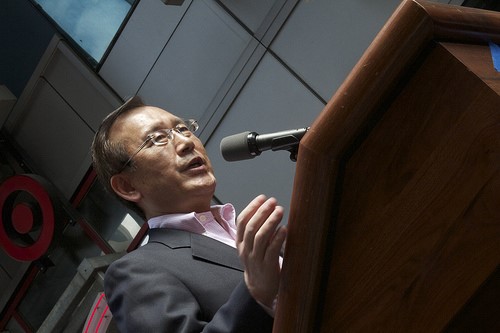A conference opened in Haifa Thursday advocating a Middle East without nuclear weapons or other weapons of mass destruction. “If Israel won’t go to Helsinki, Helsinki will come to Israel,” former MK Issam Makhoul (Hadash), chairperson of the Emil Touma Institute for Palestinian and Israeli Studies, said at the two-day conference, referring to Israel’s decision last year not to take part in a Helsinki conference on the issue. Makhoul said Israel couldn’t escape a discussion on the matter.
According to Makhoul, the Haifa conference was the first step toward opening a debate in Israel on nuclear weapons. He said an Israeli coalition of organizations and a monitoring committee would push the issue forward. Makhoul said Prime Minister Benjamin Netanyahu’s insistence on talking about the Iranian nuclear threat helped stoke the discussion on Israel’s nuclear program as well. There is now a willingness and sense of urgency in broaching the subject and telling Israelis that a different kind of Middle East is possible, he said.
The conference is the first in a series on the issue, the organizers said. Delegates came from Europe, the United States and Africa. Among the participants was Prof. Tadatoshi Akiba, the former mayor of Hiroshima, who urged a 2020 deadline for world nuclear disarmament. Akiba said no one needed to suffer as his countrymen had suffered, adding that governments had not met expectations and that civil-society groups must help governments achieve the goal.
Former Knesset Speaker Avraham Burg, who 14 years ago permitted a rare Knesset debate on the nuclear issue, said that when Israel first crafted its strategy on the issue, the country was still fragile. Israel therefore sought to create a balance of power, but what once was an asset was now becoming harmful. Calling former Iranian President Mahmoud Ahmadinejad “the best friend of Israel’s nuclear program,” Burg said Arab countries were now immersed in their own affairs and that Israel was not the excuse for everything. Burg said the formula now was that if everyone has the bomb no one will have it. He added that a discussion was needed recognizing Israel as a nuclear power and asking what Israel would get in exchange for relinquishing this status. Also, all parties must understand that countries have more to lose by possessing nuclear weapons.
Former MK Prof. Naomi Chazan (Meretz) said the fact the conference was being held was a historic moment in Israel, where there is no serious discussion on the nuclear issue. But Dr. Emily Landau of the Institute for National Security Studies offered a different take, saying the subject was constantly “under discussion in academic forums and elsewhere.” Unlike most speakers, who praised the Geneva talks between the six powers and Iran, Landau said the delegates should listen when an Iranian leader compares Israel to a dog or cancer and calls the country illegitimate. Landau said Israel, located in the middle of a dangerous region, needed to create deterrence and “was not a nuclear threat.”
Related:
Conference for a Middle East free of nuclear weapons
A call for an International Conference for a nuclear weapons free zone in the Middle East



